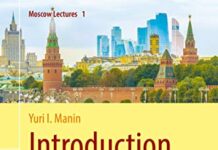
Ebook Info
- Published: 2007
- Number of pages: 232 pages
- Format: PDF
- File Size: 3.94 MB
- Authors: Yuri I. Manin
Description
The book includes fifteen essays and an interview. The essays are grouped in three parts: Mathematics; Mathematics and Physics; and Language, Consciousness, and Book reviews. Most of the essays are about some aspects of epistemology and the history of sciences, mainly mathematics, physics, and the history of language. English translations of some of the essays, originally published in Russian, appear for the first time in this selection. One of them is the introduction to the book Computable and Uncomputable, where the idea of a quantum computer was first proposed in 1980. Another is an essay on the mythological trickster figure, where the evolutionary role of manipulative behavior is discussed in connection with the problem of the origin of human language. With the foreword by Freeman Dyson, this book will be of interest to anyone interested in the philosophy and history of mathematics, physics, and linguistics.
User’s Reviews
Reviews from Amazon users which were colected at the time this book was published on the website:
⭐Here are some quotes:P. 6. “What are we studying when we do mathematics? A possible answer is this: we are studying ideas that can be handled as if they were real things.””Knowledge of the world discovered by physicists can be expressed only in the language of mathematics.”P. 21. “The basis of all human culture is language, and mathematics is a special kind of linguistic activity. Natural language is an extremely flexible tool of communicating essentials required for survival, of expressing one’s emotions … However, natural language is not very well fit for acquiring, organizing and keeping our growing understanding of nature, which is the most characteristic trait of the modern civilization.”In the process of its internal development and prompted by its inner logic, mathematics creates virtual worlds of great complexity and internal beauty which defy any attempt of describing them in natural language but challenge the imagination of a handful of professionals in many successive generations.”P. 213. “Postmodern trends of discourse put in doubt the basic criteria of recognizing the scientific truth, and try to replace them by wildly arbitrary intellectual constructions.”This last comment is very interesting, explaining the lack of rational thinking. See
⭐.
⭐For anyone interested in general mathematical culture and curious about the passions and thoughts of one of great mathematical minds this book is a must buy. Moreover, I liked the way Manin writes.
⭐This book is pure intellectual delight deeply rooted in unwavering, rigorous frame of mind of a genius mathematician.
⭐For everyone interested in the broad and deep sea of human thinking this book will provide a lot of inspiration. While some of the articles may be too technical for non-mathematicians, I would encourage everyone to make the effort.
⭐As a philosopher and applied mathematician, who uses Algebra to model the nucleus and particle theory, I found this book invaluable especially as Manin is a famous mathematician who is not all that happy with contemporary Field Theory although it is successful.
⭐Some of the chapters were way more interesting to me than others – but overall this is a unique book and would make a great gift for any graduate student of mathematics.
Keywords
Free Download Mathematics as Metaphor (Collected Works) in PDF format
Mathematics as Metaphor (Collected Works) PDF Free Download
Download Mathematics as Metaphor (Collected Works) 2007 PDF Free
Mathematics as Metaphor (Collected Works) 2007 PDF Free Download
Download Mathematics as Metaphor (Collected Works) PDF
Free Download Ebook Mathematics as Metaphor (Collected Works)

